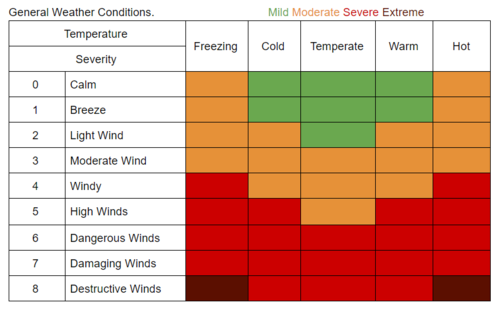Environment: Difference between revisions
(added weather/fire rules!!) |
|||
| Line 5: | Line 5: | ||
===Difficult Terrain=== | ===Difficult Terrain=== | ||
The ground is considered to be | The ground is considered to be Difficult Terrain when it would provide significant obstruction to movement - viscous mud, rocky or uneven terrain, soft sand, piles of bodies, bones, etc. Where it would normally take 1 yard of a character's base movement speed to move through a square, it will cost an additional movement speed to move safely through Difficult Terrain. | ||
===Fire and Burning Terrain=== | ===Fire and Burning Terrain=== | ||
Revision as of 12:46, 7 May 2021
Terrain
Falling
Unless otherwise specified, landing after a fall deals 1d10 per Yard fallen. If the fall is equal or less than 3 yards, this damage is dealt as Non-Lethal, however, falling more than 3 yards deals Lethal damage.
Difficult Terrain
The ground is considered to be Difficult Terrain when it would provide significant obstruction to movement - viscous mud, rocky or uneven terrain, soft sand, piles of bodies, bones, etc. Where it would normally take 1 yard of a character's base movement speed to move through a square, it will cost an additional movement speed to move safely through Difficult Terrain.
Fire and Burning Terrain
Targets or objects that end a round on burning terrain take a static amount of environmental damage determined by fire size and gain a continuous Burning status. Each time that the target ends a round amongst the flames, that damage increases by 1d10 to a maximum of 3d10. The target will continue to take damage each round until it escapes the fire and its Burning status ends. When a target is no longer standing on burning terrain, the Burning condition becomes properly active. Frost cannot be applied to a target occupying actively burning terrain to put out the target’s flames.
Fires of any size have a chance to spread, rolling a set number of dice each round and spreading to 1 adjacent tile per success. Directionality of the spread is at the discretion of the Storyteller, unless otherwise specified.
| Size | Area | Growth | Env. Damage |
|---|---|---|---|
| Small | 1 yd. | 3d10 | 1d10* |
| Med | 2-4 yd. | 6d10 | 1 |
| Large | 5-9 yd. | 12d10 | 2 |
| Huge | 10+ yd. | 18d10 | 3 |
*Small fires have a small chance to deal damage, and only apply Burning if successful.
Extinguishing Fires
There are myriad ways that fire might be extinguished. A few examples:
- Stop, Drop, and Roll. Burning targets may take a Move Action to fall prone and roll to put out the fire and prevent further damage.
- Water. A large bucket of water (which must be carried with two hands) may be used to extinguish approx 1 sq. yard of fire (or 1 medium creature). Magical abilities that call down rain or conjure water may extinguish any mundane fire within the area of the spell.
- Frost. The Frost effect is known to reduce the duration of Burning in most scenarios. An area of effect ability, such as Cone of Cold, may extinguish mundane fires on all tiles within its target area if successfully cast. To extinguish magical fires, the caster makes an opposed roll vs. the number of successes with which the magical fire was initially created.
Outside of this list, the effectiveness of any given method of fire-extinguishing is left to the discretion of the Storyteller.
Deep Water
Weather/Climate
The weather in Lorithandar can vary drastically from one region to another - and is generally controlled by the Storyteller with a few notable exceptions. The Control Weather spell available to channelers of the Storms Domain and some Air Shaman allows players to have some control over the weather in their immediate area. Still, in day-to-day play, it is important to know how weather affects targets in practice.
Weather is categorized based on three characteristics: Temperature, Wind Severity, and Precipitation. Temperature and Wind Severity help categorize weather as Mild, Moderate, Severe, or Extreme (see below table).
Temperature
Temperature ranges from Freezing to Hot. Targets vulnerable to temperatures on either end of the spectrum may find themselves feeling the effects. In hot or cold climes, a target lacking appropriate means to regulate their body temperature (at the Storyteller’s discretion) occasionally takes penalties due from exposure.
| Temperature | Effect | Time Frame |
|---|---|---|
| Freezing | Applies 1 stack of Frost | Every 30 minutes |
| Cold | Applies 1 stack of Frost | Every 60 minutes |
| Temperate | N/A | N/A |
| Warm | Fatigue increases by 1 | Every 60 minutes |
| Hot | Fatigue increases by 1 | Every 30 minutes |
Wind Severity
Precipitation
The presence of precipitation, in addition to the other components of weather, can add an extra layer of complexity to how players deal with their environment. For example, wet surfaces are able to conduct Shock farther than its natural range. Rain may also naturally Extinguish existing fires, rolling a set number of dice each round and extinguishing 1 sq. yard of fire per successful roll.
The significance of any precipitation is dependent on the weather category and temperature.
| Category | Description | Extinguish | Other Effects |
|---|---|---|---|
| Mild | Precip. | 6d10 | Targets within range become wet. |
| Moderate | Heavy Precip. | 12d10 | -1 Perception |
| Severe | Storm | 18d10 | -1 Perception, Light Cover from targets >30 yards |
| Extreme | Blizzard, Hurricane | 30d10 | -2 Perception, Moderate cover >30 yd |
